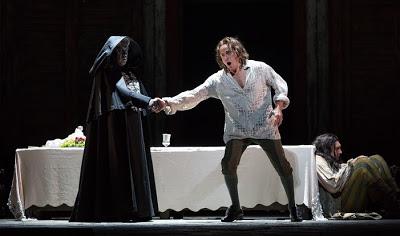by Paul J. Pelkonen

The statue of the dead Commendatore (Kwangchal Youn, left) takes Don Giovanni
(Simon Keenlyside) down to Hell as Leporello (Adam Plachetka) cowers on the right.
Photo by Marty Sohl © 2016 The Metropolitan Opera.
This latest revival has a cast capable of wrestling with the score on its own terms. They were led by Simon Keenlyside, looking hale and sounding healthy after a four year absence from the Met stage. Mr. Keenlyside has been singing this role for two decades, and brought comic timing, his slightly dry, intelligent baritone and bits of welcome stage business that snazzed up this show. He produced the blend of seductive wiles and manic energy that propels the Don down the road to perdition, and was marvelously defiant to the end. He was helped by the encyclopedic and sympathetic leadership of Fabio Luisi in the Met pit.
As his Leporello, the towering, full-voiced Adam Plachetka was less mirror image than able foil, visibly frustrated with his master's shenanigans, some of which left him holding the proverbial bag. Mr. Plachetka delivered a marvelous and very funny "Catalogue Song" in the first act, made better by Donna Elvira's (Malin Byström) palpable disgust at this long list of the Don's conquests. His comic timing in scenes with Masetto (Matthew Rose) contributed much to the busy climax of the first act, and his interjections improved the opera's fiery climax.
The finest singing of the night came from tenor Paul Appleby. As the callow Don Ottavio, this Juilliard product made one glad that this production includes both the Vienna and Prague arias for tenor, giving him solo spots in each act. His "Dalla su pace" was taken very slowly, with lingering pianissimi and lovely control. "Io mio tesoro" was faster, delivered as an address to the other characters (a good idea) rather than the standard "stand-and-sing" aria that stops the opera dead.
The problems were with the Don's would-be conquests. Hibla Gerzmava was a frustrating Donna Anna, opening "Or sai chi l'onore" with lovely and appropriately heroic tone. When she ramped up into her upper register for that aria's three climactic passages, her voice compressed and tightened, narrowing to a sharp and much less pleasing sound. She was better in "Non mi dir" in Act II, taking advantage of the slower passages, but there was still some trouble navigating the last twists and bends of ornamentation .
Ms Byckström played Donna Elvira as crazy from her first entrance. Her entrances and interference with the Don's sex life had all the force of a good running gag, instead of the random encounters that most directors settle for. She made "Mi tradi" passionate and moving, although some of her syllables were garbled. Serena Malfi made a strong effort as Zerlina but she too, strained when reaching for her upper register. Matthew Rose was a good fit for Masetto, and Kwangchal Youn brought vocal stature to the role of the Commendatore. He engaged in a convincing fight sequence with Mr. Keenlyside in Act I and delivering presence and huge round tone to the opera's final conflagration.
As mentioned at the top of the article, this production has serious issues, with dreary sets, difficult stage blocking (presumably to accommodate Live in HD camera angles) and the whoosh-thump of propane cannons drowning out the orchestra in the damnation scene. However, the Met's in-house directors have made the best of things with minor tweaks: extended dance sequences and choreography in the Act I wedding and ball scenes, and a bevy of disreputable-looking women serving as Don Giovanni's "dinner" right before he is dragged to his fate. However, the night belonged to Mr. Keenlyside, whose bold spirit and fiery, inventive performance burned brighter than the pyrotechnics.

